CESA
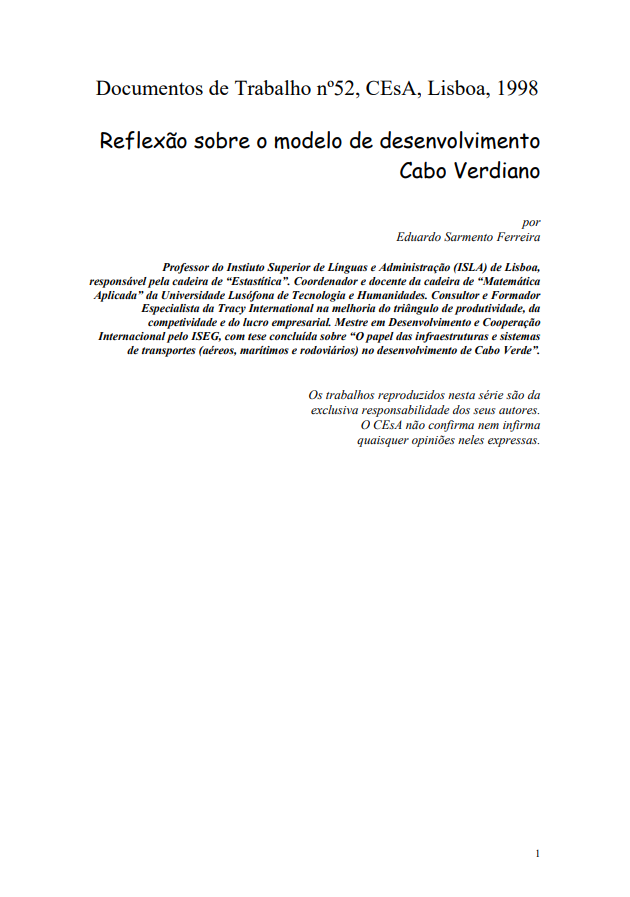
Working Paper 52/1998: Reflexão sobre o modelo de desenvolvimento cabo verdeano
Abstract:
When one considers the general problem of the development of small island countries and the specific case of Cape Verde, essential questions immediately arise due to some particularities of this country. In this regard, Philippe Hein concluded that several of the issues inherent to small economies arise from their own characteristics. The specific constraints of a small island country pose major obstacles to Cape Verde’s development. This island state undoubtedly faces a major challenge to overcome the constraints inherent to insularity with the existing means. The longed-for change is possible but it will require great effort, the continued implementation of measures aimed at overcoming the current situation and, above all, a great deal of persistence. Reflexão sobre o modelo de desenvolvimento cabo verdeano (Reflections on the Cape Verdean development model) has as its main objective to systematise and reflect on Cape Verde’s situation, taking into account the existence of some specific handicaps that small island economies usually face. It also aims to analyse what has been developed in order to overcome these constraints.
Quotation:
Ferreira, Eduardo Sarmento. 1998. “Reflexão sobre o modelo de desenvolvimento cabo verdeano”. Instituto Superior de Economia e Gestão. CEsA (Centro de Estudos sobre África e Desenvolvimento) – Documentos de Trabalho nº 52/1998
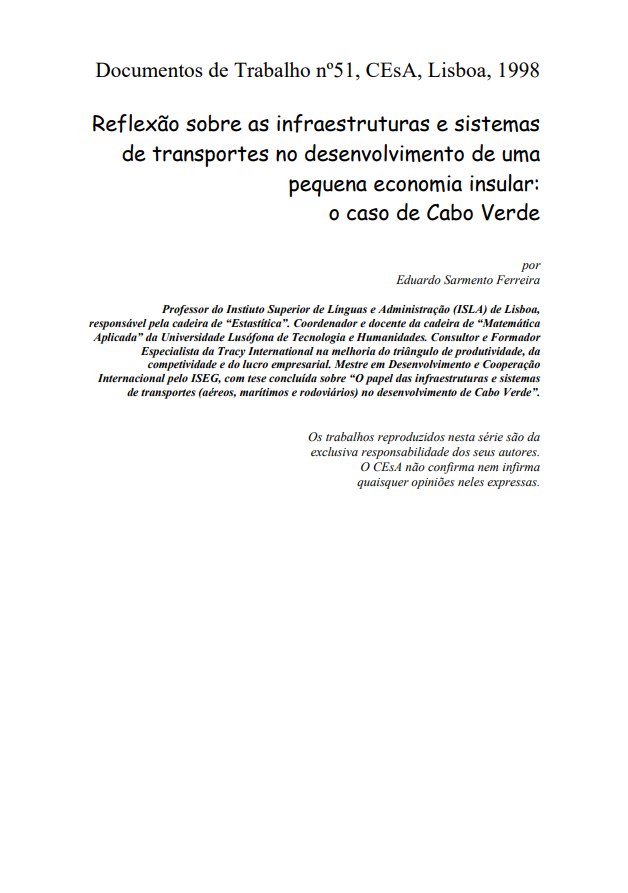
Working Paper 51/1998: Reflexão sobre as infraestruturas e sistemas de transportes no desenvolvimento de uma pequena economia insular: o caso de Cabo Verde
Abstract:
Reflexão sobre as infraestruturas e sistemas de transportes no desenvolvimento de uma pequena economia insular: o caso de Cabo Verde intends to equate the role that infrastructures related to transport and transport systems, mainly air and maritime, have been playing in the development strategy adopted by Cape Verde. Despite the existence of multiple definitions of infrastructure, in this article we will use that of the World Bank, which groups the characteristics of economic infrastructure into three groups: public services (energy, telecommunications, piped gas, etc.), public works (roads, irrigation and drainage pipelines) and other transport sectors (railways and waterways, urban transport and airports). Infrastructures articulate and condition development in different ways. Fundamentally, it acts on three levels: economic activity, “poverty” and the environment. As analysed throughout this article, infrastructure and transport are fundamental, although by themselves they do not bring about development. It is essential that these investments are articulated with the entire national economy, are rationally applied and, above all, regardless of whether they are new or old, public or private, are well managed.
Quotation:
Ferreira, Eduardo Sarmento. 1998. “Reflexão sobre as infraestruturas e sistemas de transportes no desenvolvimento de uma pequena economia insular: o caso de Cabo Verde”. Instituto Superior de Economia e Gestão. CEsA – Documentos de Trabalho nº 51/1998
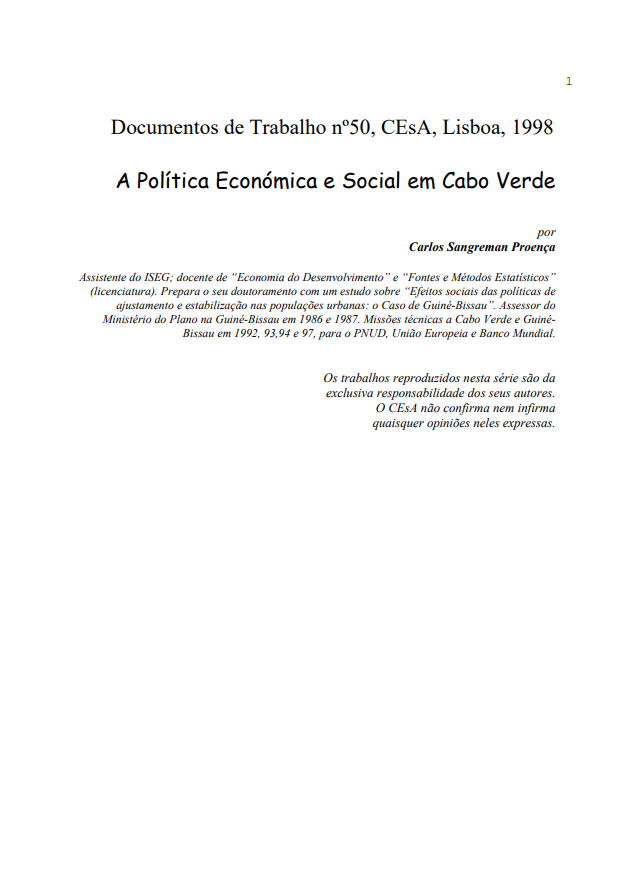
Working Paper 50/1998: A política económica e social em Cabo Verde
Abstract:
The texts published in A política económica e social em Cabo Verde have their origin in a study carried out for the European Union, in July/August 1997, on Cape Verde. This study was intended, in short, to: – Technically justify Cape Verde’s access to specific European Union funds to support structural adjustment policies within the scope of the Lomé Convention. – Support the decisions of the international community to support the implementation of the National Development Plan 1997-2000 prepared by the Government. – Look for suggestions for a volume of domestic debt that is unsustainable by the Cape Verde Budget. The texts used for the present publication were the first versions of part of those that were prepared by the author and presented for discussion to the whole team, which transformed/approved/rejected them and included them in the final version of the report. The reason for this publication is the usefulness, in the dissemination of texts on the theme mentioned, for disciplines in the area of development. It also comes from the obvious relationship that the author believes exists between this type of study and the connection of the scientific community to the real world.
Quotation:
Sangreman, Carlos. 1998. “A política económica e social em Cabo Verde”. Instituto Superior de Economia e Gestão. CEsA – Documentos de Trabalho nº 50/1998
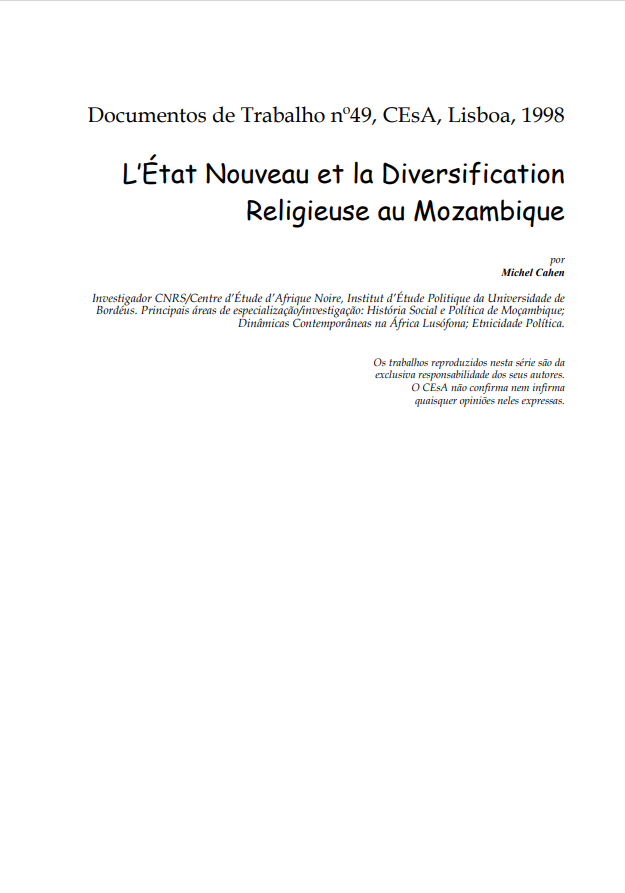
Working Paper 49/1998: L’État nouveau et la diversification religieuse au Mozambique
Abstract:
Contemporary Portuguese history, even that of the 20th century until 1974, has obviously remained marked by that of the “Catholic kings” of the modern era and the Discoveries. The empire, with however particularities, was no exception in this religious environment. Catholicism was one of the foundations of the national (metropolitan) imagination, inseparable from the imperial idea. This country, territorially modest since Brazilian independence (1820) could not be conceived without keeping the rank of those who had “offered new worlds to the world” in the name of Christianity. This is why throughout Utramar, the integration of the Portuguese Catholic Church into the State was close, even if it can be considered more or less intense: it was a major factor in the construction of the apparatus colonial state itself which, after the humiliations of the Congress of Berlin (1885) and the British ultimatum (1890), was to constitute the major tool of greatness and prestige restored to the nation, after the long period of decline. However, in this relationship, it would be wrong to think that everything was always simple and linear. Apart from the fact that part of the colonial personnel in place during the Estado Novo (New State) had been educated even during the time of the Republic (1910-1926), did not die of clerical love and only gradually disappeared At the end of the 1950s, the administration of the territories was subject to imperatives of efficiency which depended on the contexts and did not necessarily correspond to Roman desiderata. The historical analysis presented in L’État nouveau et la diversification religieuse au Mozambique therefore does not relate to colonial religious history in Mozambique, as such, but to the religious policy of the State within the framework of Portuguese nationalism. Nevertheless, this question of the state makes it necessary to first clarify a few points that are debated in recent historiography relating to Portugal.
Quotation:
Cahen, Michel. 1998. “L’État nouveau et la diversification religieuse au Mozambique”. Instituto Superior de Economia e Gestão. CEsA – Documentos de Trabalho nº 49/1998.
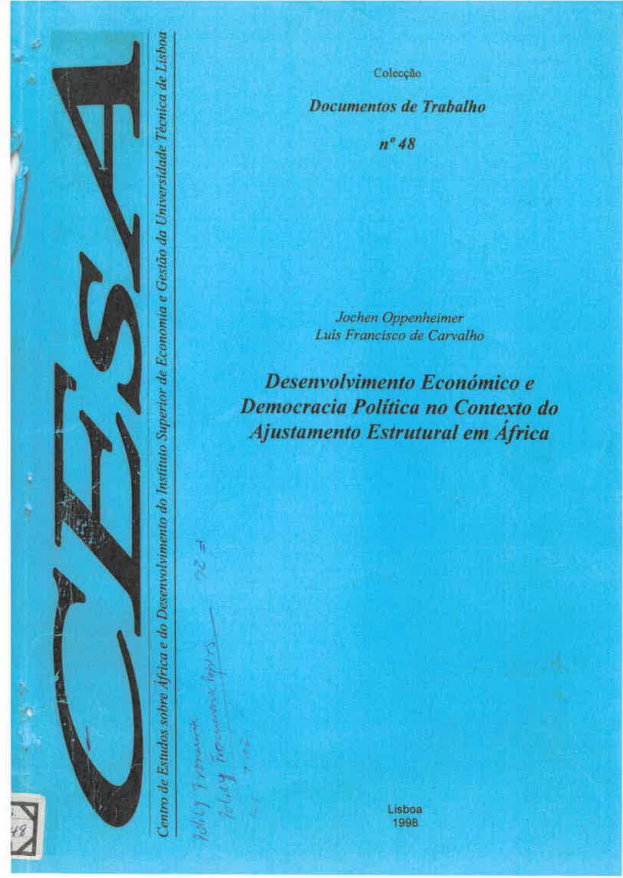
Working Paper 48/1998: Desenvolvimento económico e democracia política no contexto do ajustamento estrutural em África
Abstract:
The discussion that we propose here in Desenvolvimento económico e democracia política no contexto do ajustamento estrutural em África of these democratization processes focuses on the articulation between political democracy and economic development, and more particularly on the specific configurations that this relationship takes within the framework of the African experience. In this sense, we begin by observing the international context in which the «democratic turn» takes place, namely with regard to the transformation of the logic of conditionality of public development aid. Attention is particularly focused on the emergence of discourses and practices of political conditionality in the framework of stabilization and structural adjustment, carried out by the World Bank at the turn of the 1990s. At the same time, it is important to mention the approach of bilateral donors and other international institutions, more explicitly associated with the issue of democracy and respect for human rights. Next, we use the empirical literature available to assess the foundation of the virtuous relationship between democracy and advanced development as a justification for the new political conditionality. Two types of methodology are addressed: econometric studies and comparative sociocultural analyzes of different historical experiences.
Quotation:
Oppenheimer, Jochen e Luis Francisco de Carvalho. 1998. “Desenvolvimento económico e democracia política no contexto do ajustamento estrutural em África”. Instituto Superior de Economia e Gestão. CEsA – Documentos de Trabalho nº 48/1998.
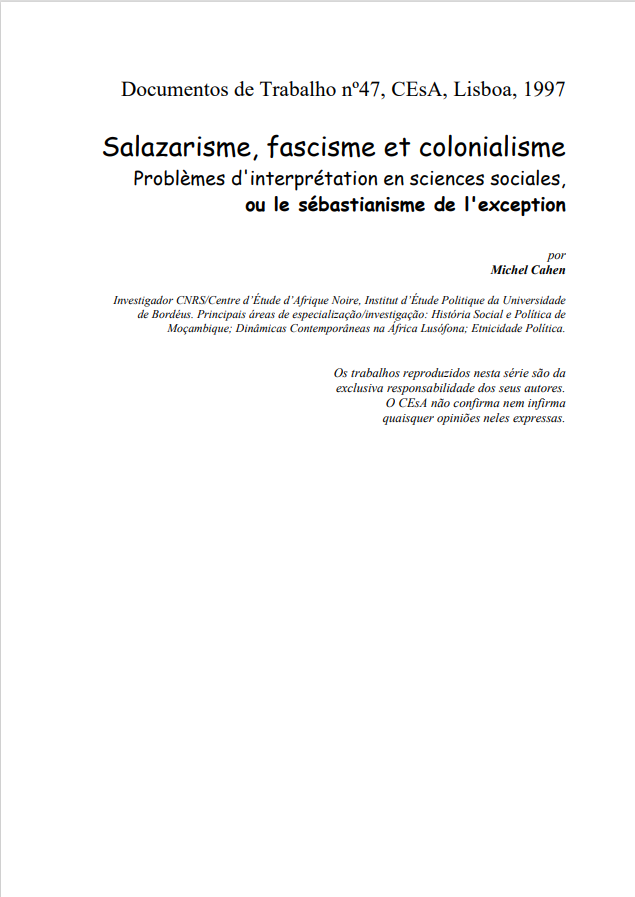
Working Paper 47/1997: Salazarisme, fascisme et colonialisme: problèmes d’interprétation en sciences sociales, ou le sébastianisme de l’exception
Abstract:
The discussion on contemporary Portuguese colonization necessarily stands at the crossroads of two debates: the first, concerning the nature of the political system in force in France from 1930-33 to 1974 (the “Situation” or Estado Novo); the second, on the depth of the particular characteristics of colonization from the Congress of Berlin (1884-85) to 1974, i.e. a phenomenon on which the Estado Novo weighed considerably but which preceded it. To sum up the question (too) quickly, we could formulate it in two stages: if the metropolis experienced a “fascist” regime, would the colonies be “colonial-fascist”? If the metropolis cannot be thus characterised, is that also why the empire did not take the form of “colonial-fascism”? The debate is really much broader. To grasp the realities of the Portugal/Impire complex in the 20th century, the question is whether we need particular concepts that emphasize the Lusitanian “exception” or whether, on the contrary, this history is only comprehensible by resorting to the general concepts of the history of European imperialisms of this century. After having “framed” this contribution with some metropolitan considerations, the colonial question (and its eventual exceptionality) will be addressed in Salazarisme, fascisme et colonialisme: problèmes d’interprétation en sciences sociales, ou le sébastianisme de l’exception mainly from the point of view of the European Union, the colonial issue (and its possible exceptionality) mainly from the point of view of its SOLIS, the angle of its political institutions. But it should be immediately underlined that the characteristics of the economic angle (an “ultra-colonialism”), and that it is not possible to discuss the characteristics of this one (an “ultra-colonialism”? an “archaism”? a “mercantilism” maintained in the heart of the 20th century? a deep “assimilation”? an unparalleled “métissage”? a surprising “absence of racism”? The study of each of these questions always leads to the highlighting of particularities which are not negligible, but which, once the population is metropolitan and widely spread abroad, appear as nuances within the contemporary imperialist phenomenon, which makes it necessary not to create conceptual categories if we want to understand the conditions of production and the way they function and operate.
Quotation:
Cahen, Michel. 1997. “Salazarisme, fascisme et colonialisme: problèmes d’interprétation en sciences sociales, ou le sébastianisme de l’exception”. Instituto Superior de Economia e Gestão. CEsA – Documentos de Trabalho nº 47/1997
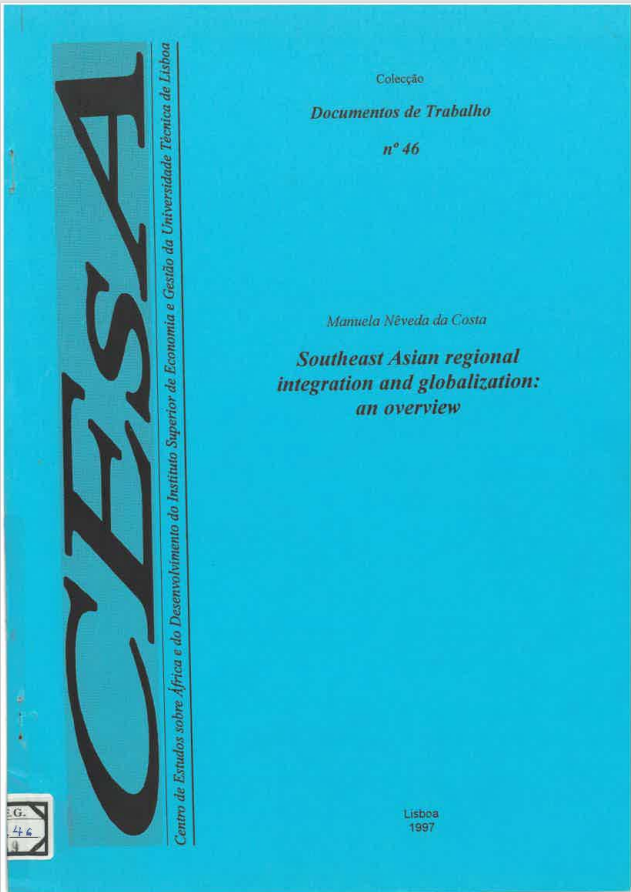
Working Paper 46/1997: Southeast asian regional integration and globalization: an overview
Abstract:
In the last three decades the Newly Industrializing Economies (NIEs) of East Asia (Hong Kong, Singapore, S. Korea and Taiwan) generated the fastest industrial revolutions the world has ever seen, achieving very rapid economic growth, extraordinary export performance, and relatively high standards of living. Other economies in Southeast Asia, namely the ASEAN-4 (Indonesia, Malaysia, Thailand, and to a lesser extent The Philippines)(2), China and more recently Vietnam, are also experiencing rapid growth and structural change. As their economies grew so did their interdependence and their importance in the global economy. Southeast asian regional integration and globalization: an overview examines the changes that have been taking place in the Southeast Asian economies from an international perspective, their increasing integration with the more advanced economies in the Pacific-Asia region Japan and the NIEs) and their participation in the globalization process. The Pacific-Asia region, as defined in this study, runs from the Korean peninsula to Indonesia and comprises the countries normally identified as East Asia (Japan, the Koreas, China, Hong Kong and Taiwan) and Southeast Asia (Indonesia, Malaysia, The Philippines, Singapore, Thailand, Brunei, Indochina and Myanmar). Extraordinary diversity characterizes this region. These differences are not only cultural and historical, geographical and demographic, social and political, but most strikingly, economic. Table 1 provides basic economic indicators that illustrate these differences. Japan, bounced back from war devastation to become again an economic powerhouse and the undisputed economic leader in the region. The next tier of development is taken by the NIEs, which have emerged as economic powers in their own right. The city-states of Hong Kong and Singapore are now labeled “high income economies” by the World Bank. South Korea became a member of the OECD in 1996 and Haiwan is poised to join it. The ASEAN-4 come next with Malaysia and Thailand graduating to “upper-middle” and “middle” income economies, respectively, whereas The Philippines and Indonesia joined the ranks of “lower-middle.” Next comes China, whose importance can not be overstated (Perkins, 1986). And just entering the picture are the countries of Indochina, with Vietnam in the lead, after embarking in major economic reforms and gaining momentum with its accession to ASEAN. Cambodia and Laos, essentially agricultural and with small populations, (ten and five million) and Myanmar are lagging behind.
Quotation:
Costa, Manuela Nêveda da. 1997. “Southeast asian regional integration and globalization: an overview”. Instituto Superior de Economia e Gestão. CEsA – Documentos de Trabalho nº 46/ 1996.
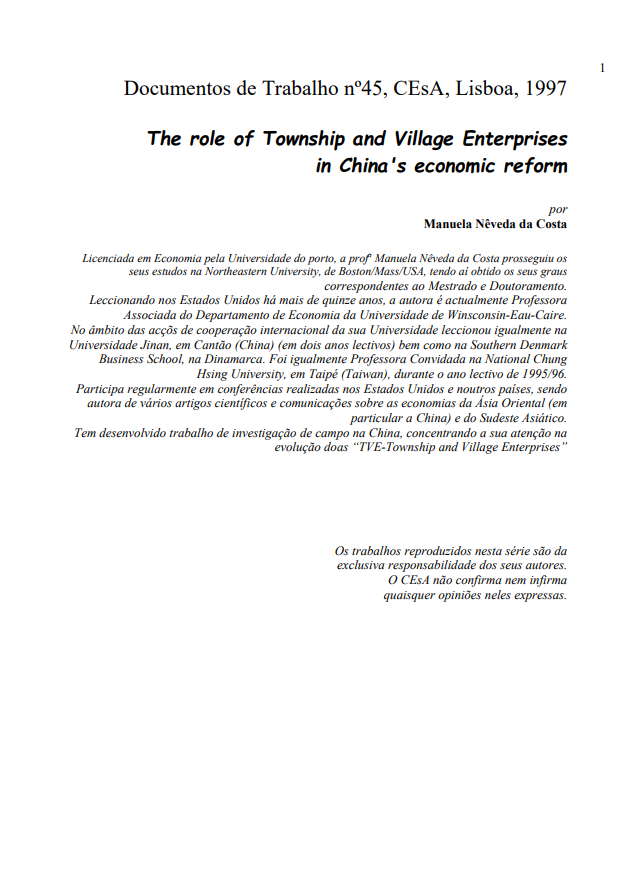
Working Paper 45/1997: The role of township and villages enterprises in China’s economic reform
Abstract:
The role of township and villages enterprises in China’s economic reform examines the origins, development, and prospects of China’s township and village enterprises (TVEs) in the context of transition from a centrally planned economy (CPE) to a market economy. China’s economic reform is occurring with no major changes in the political system. The Chinese advocate a “socialist market economy,” or “socialism with Chinese characteristics,” implying, among other things, limited private ownership of the means ofproduction.2 However, in the context ofeconomic reform, China has adopted measures that are irrzvocably changing its economy and society. The “household contract responsibility system” and the “open door plicy” have led the nation onto a transition path characterized by multiple and complex forms of enterprise ownership. There are state- owned enterprises (large, medium, and small units), collecrive-owned enterprises (run by townships and villages, cities, counties, towns and street committees), and privare-owned enterprises (individually owned, jointly owned, and privately owned cooperation limited). There are alsojoint ownership units (jointly invested by enterprises of different ownership), share holding economic unirs (limited companies and limited liability economic unio (including joint-ventures, joint cooperation enterprises, and foreign capital-only enterprises), and economic units owned by Overseas Chinese from Hong Kong, Macao and Taiwan. The creation and proliferation of the so-called township and village enterprises TVEs), arguably the most distinctive feature of Chinese transition, have been highly instrumental in the success of China’s economic reform. Key to their success seems to be the high degree of competition, flexibility, and autonomy, which have occurred without significant privatization. What are TVEs? Why did the TVEs arise? What role are they playing in China’s transition process? Why their success? What challenges are they facing? These are the issues examined in this study.
Quotation:
Costa, Manuela Nêveda da. 1997. “The role of township and villages enterprises in China’s economic reform”. Instituto Superior de Economia e Gestão. CEsA – Documentos de Trabalho nº 45/1997.
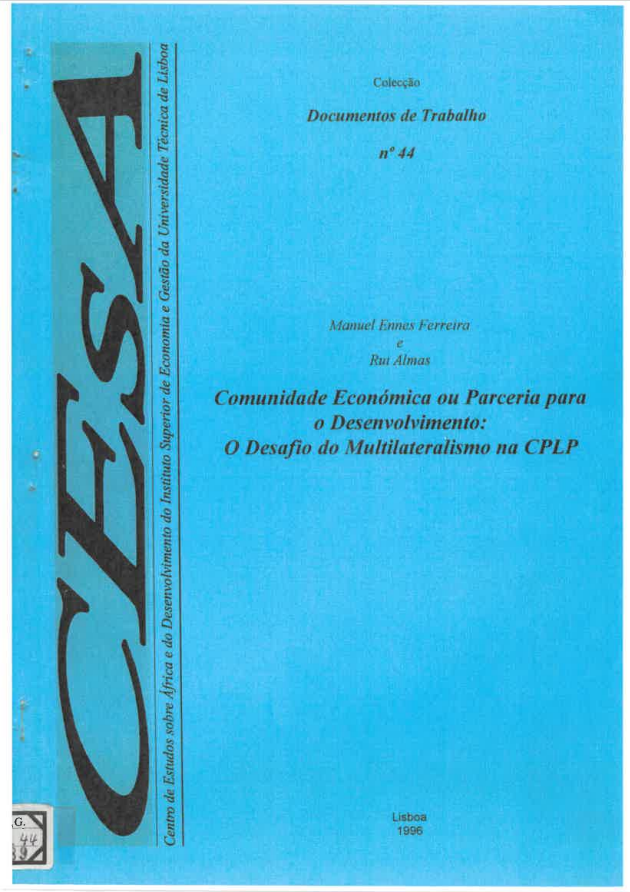
Working Paper 44/1996: Comunidade económica ou parceria para o desenvolvimento: o desafio do multilateralismo na CPLP
Abstract:
The 17th of July 1996 will certainly go down in the history of the member countries of the recently created Community of Portuguese Speaking Countries (CPLP). In Comunidade económica ou parceria para o desenvolvimento : o desafio do multilateralismo na CPLP we discuss, on the one hand, how it could become an important political instrument for “increased cooperation at all levels – cultural, economic, social, scientific and legal-institutional – as well as political-diplomatic consultation”, thus contributing to promote the development of your people; but, on the other hand, may be nothing more than another lost opportunity to achieve that goal, either by having become a stillborn, as called to attention 0 president of Guinea-Bissau when he said in the act of establishment of the CPLP that had no doubt “that the same questioning stirs deep within us about the future of the association that we formalized. Is it reserved to him the banal fate of so many alliances that, getting lost in bureaucratic meanderings, only exist when they meet responsible is to have become entangled in a mere verbalization pious and circumstantialist, aspect underlined by the president of the first tests of our community will be to move from the sentimental rhetoric and grandiloquent, for an effort of solidarity and between aid able to restore the minimum dignity to millions of citizens “.
Quotation:
Ferreira, Manuel Ennes e Rui Almas. 1996. “Comunidade económica ou parceria para o desenvolvimento : o desafio do multilateralismo na CPLP”. Instituto Superior de Economia e Gestão. CEsA – Documentos de Trabalho nº 44/ 1996.
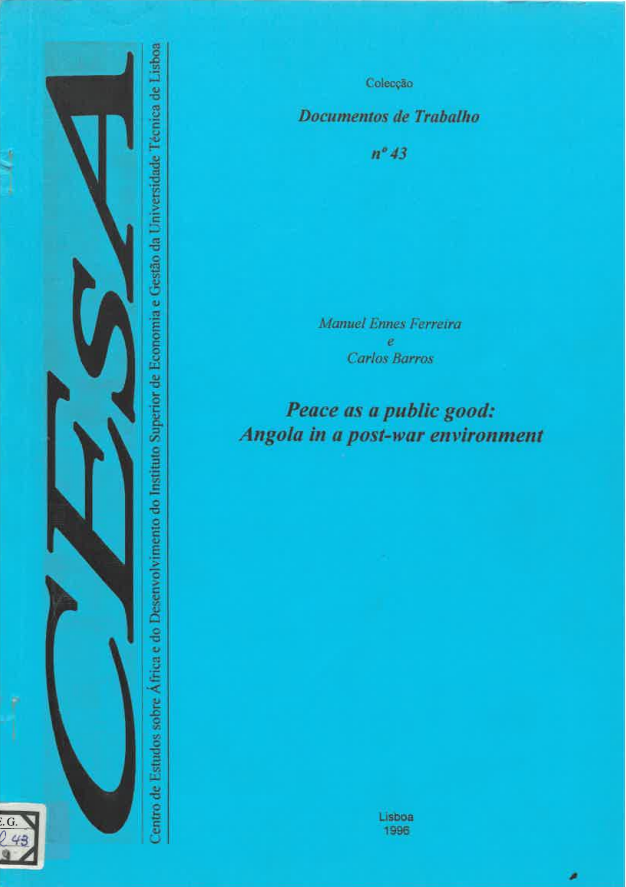
Working Paper 43/1996: Peace as a public good: Angola in a post-war environment
Abstract:
After twenty years of civil war in Angola, and following the country’s devastation, transition to a market economy and democracy has finally begun. The State of Angola must now finance the country’s reconstrucion. The end of the war has prompted individual expectations of a real income rise. Within this context, Peace as a public good: Angola in a post-war environment sets out to analyse the willingness of civil servants to help pay (wtp) for consolidation of a public good – peace – in Angola. At the same time the authors calculate the extent to which civil servants are willing to accept (wta) government compensation should it fail to assure this public good. The model used is based on a subjective expected utility function and the sample is taken from high-ranking public administration staff. Results obtained permit one to determine and to interpret wtp and wta by age, sex, hierarchical position, income and number of military conscripts per family. Since its independence, Angola has been involved in a civil War that has severely restricted its potential for development; hence the clear economic interest in halting the war. To achieve this goal, peace must be politically agreed and subsequently strengthened. Consolidation Of peace entails economic costs that must be faced, namely costs involved in demobilizing the military, rebuilding the infrastmctures destroyed by the war and modernizing the country. The feelings of concern with regard to this economic effort are considerable, namely those arising from distribution of the costs and benefits of a programme of such a magnitude among the country’s different social classes.
Quotation:
Ferreira, Manuel Ennes e Carlos Barros. 1996. “Peace as a public good: Angola in a post-war environment“. Instituto Superior de Economia e Gestão. CEsA – Documentos de Trabalho nº 43/ 1996.





